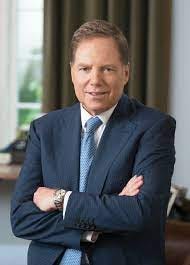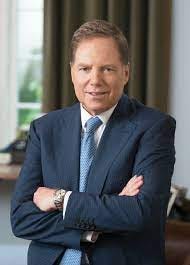Power and Control
Does the fact of appointment alone guarantee control over the federal prosecutor's decisions?
The Attorney General, high-ranking Justice Department officials, and United States Attorneys are appointed by the President with the advice and consent of the Senate. When making these appointments, Presidents generally choose people who share a similar ideology to the President. Sometimes they do so thinking that the person appointed will blindly do the President’s bidding. When there is disagreement and the prosecutor refuses to do what the President demands, the prosecutor could be labeled disloyal. Others, however, may praise the prosecutor as expressing independence. Geoffrey Berman, who was the United States Attorney for the Southern District of New York for part of Donald Trump’s presidency, reveals that merely appointing someone as a United States Attorney does not result in servile compliance.
On January 3, 2018, President Trump appointed Berman as interim United States Attorney for the Southern District of New York. Even before receiving the appointment, the U.S. Attorney post for that office had become controversial. During the Obama presidency, Preet Bharara served as United States Attorney. According to Bharara, he was told that President Trump wanted to retain Bharara in the position. Apparently without notice, this changed in March, 2017 when Bharara was included among over 30 United States Attorneys asked to resign. This, itself, was not unusual as United States Attorneys appointed by one party often resign when the other party assumes the White House. The unexpectedness of Bharara’s inclusion created some controversey.
Of all the United States Attorney offices, the Southern District of New York stands alone. Colloquially referred to as the “Sovereign District of New York,” the district functions relatively independent from the Justice Department. It also operates independently of political considerations. This has given the office significant credibility when it initiates prosecutions and it has successfully prosecuted some of the most high-profile criminal cases in the nation’s history. When Bharara was removed, many people believed it posed a threat to the office’s independent and non-partisan tradition.
Berman’s background provided fodder for both sides of the politicization debate. His early career indicated that he operated independently of political considerations. Out of law school, Berman clerked for Judge Leonard Garth of the Third Circuit Court of Appeals. Garth was a Nixon appointee and counts Supreme Court Justice Samuel Alito as one of his former clerks. With these Republican credentials, Berman accepted a position with Independent Counsel Lawrence Walsh who was investigating the Iran-Contral Affair that arose during Ronald Reagan’s presidency. Following that experience, Berman served as an Assistant United States Attorney for the Southern District of New York.
Despite the independent background, Berman faced questions following his appointment because of his connection to Rudy Guiliani, who had become intimately linked to President Trump, and because of an investigation of Halkbank, the national bank of Turke y, that had begun during Preet Bharara’s tenure. Berman and Giuliani connected while both served as partners at a large New York law firm. Giuliani’s connection to Trump was well known and people speculated that Giuliani’s influence would lead to Berman’s appointment as New Jersey’s United States Attorney. Instead, Berman received the interim Southern District position. People speculated the change resulted from the Southern District’s investigation into two Giuliani associates on charges of campaign fundraising charges. Berman’s office brought charges against the two who both later entered guilty pleas.
Speculation also surrounded an ongoing money laundering investigation into Halkbank, Turkey’s national bank. President Trump made no secret of his affection for Turkey’s president, Recep Erdogan. Even before Trump’s innarguration, Erdogan attempted to exert influence to obtain the return of a Turkish dissident. Erdogan also sought to infuence the prosecution of Halkbank and its customers. When Erdogan approached Trump early in Trump’s presidency about the Halkbank case, Trump informed Erdogan that the Southen District people were “Obama people” and that he was working on replacing them. Thus, when Bernam was placed in the position, people reached the conclusion that Trump was fulfilling his promise to Erdogan. LIke with Giuliani’s associates, Berman prosecuted the Halkbank case although that case is still ongoing after the Supreme Court said that Halkbank lacked sovereign immunity in June, 2023.
Trump failed to realize or completely miscalculated the effect of the Southern District of New York’s traditional independence and the ethos of leaving partisan politics at the door. According to Berman, both President Trump and Attorney General Bill Barr pressured Berman to take certain actions. One instance involved pressure to prosecute former Senator and Secretary of State John Kerry for violating the Logan Act, an unused 18th century federal law prohibiting citizens from influencing foreign government officials. Kerry had met with Iranian officals, encouraging them to comply with the arms deal Kerry brokered as Secretary of State. Berman refused Justice Department requests to initiate a prosecution.
In another matter, Berman was asked by Edward O’Callaghan, a politically appointed attorney in the Justice Department’s National security Division, to prosecute former Obama Administration White House counsel Greg Craig. According to Berman, this was to be done to balance the scales after the Southen District of New York prosecuted Trump-supporter and member of the House of Representatives Chris Collins for conspiracy to commit insider trading and making false statements to investigators. The case also involved statements relating to Craig’s relations to Ukraine, the subject of President Trump’s first impeachment trial. When Berman refused to indict, the Justice Department pursued the matter, leading to Craig’s acquittal. As I wrote about several issues ago, current Trump special prosecutor Molly Gaston participated in the Craig prosecution.
It quickly became apparent to President Trump that Berman would not act in whatever manner the President or the Attorney General wished. The simple fact of appointing a person to the United States Attorney post was not sufficient to give the President the absolute control over federal prosecution, despite him believing he had this power. In the summer of 2020, Attorney General Barr announced that Berman had resigned. Berman responded this was not the case. This led to a deal whereby the chief assistant in Berman’s office would assume the United States Attorney position, thus ensuring continued independence from the White House and the Justice Department.
This cautionary tale leads one to question whether the same thing would have happened in another district. The Southern District of New York has a long tradition of independence that makes resistance easier. Its Manhattan location, the venue for nearly all major federal criminal offenses, also aids its independence. As the Craig case exemplifies, however, there are other federal prosecutors who will step in if the Southern District of New York refuses.
Even though the Southern District of New York is something of a unicorn among federal prosecutors, it still demonstrates that the President does not have absolute control over any federal prosecution. To use criminal prosecution as a means to assassinate someone politically or to execute personal vindictiveness takes much effort and would face much resistance.
I hope you enjoyed this issue and that it made you stop and think. I would love to hear any comments, questions, concerns, or criticisms that you have. Leave a comment or send a message! Also, if you enjoyed this or if it challenged your thinking, please subscribe and share with others!




